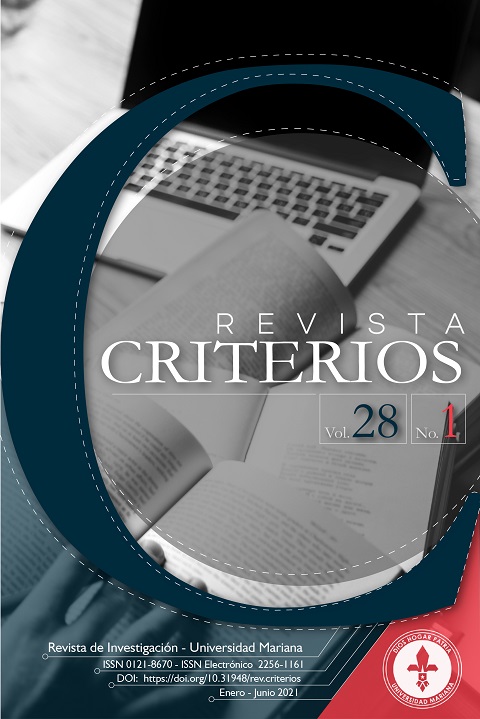The curriculum and pedagogy in the midst of the pandemic
DOI:
https://doi.org/10.31948/rev.criterios/28.1-art10Keywords:
Patient satisfaction, knowledge, quality control, comprehensive health careAbstract
In the following lines, this thoughtful article aims to open up criticism and hope for education about what is happening in 2020: a pandemic that mobilizes and energizes life, the economy, politics, and the states of mortality of human beings. This is the dichotomy that opens between the life and death of an entire population that inhabits planet Earth. The fragility of the human being is exposed by a pandemic that until now, neither science nor the great powers have been able to stop, causing him affectation, as a mass subject who is on the verge of death. The ‘ser-a-la-mano’ of Heidegger becomes valid in these times. We find existence and value in things when they cease to be useful to us; now everything becomes something valuable: to see the wheels of the cars that roll, to hear the sounds of electrical appliances, the plants in our house, our breathing, everything begins to have a different meaning. That is why throughout this think-piece article we will work on the meaning that education takes in this situation called the COVID-19 pandemic. Against this, pedagogy and the curriculum are involved and called as two dissonant aspects in Colombian education. Critical hermeneutics is taken into account as a methodological approach for the documentary analysis of the categories that we want to make known, such as: pedagogy, curriculum, and pandemic.
Author Biographies
Doony Harvey Rosero-Montezuma, Universidad Mariana
Nutricionista y dietista. Tecnólogo en Radiodiagnóstico y radioterapia. Docente e investigador, Universidad Mariana.
Jessica Andrea Bejarano-Chamorro, Universidad Mariana
Estudiante de Doctorado en Educación, Universidad del Valle; Magister en Pedagogía; Licenciada en Filosofía y Ciencias Religiosas. Docente investigadora, Universidad Mariana.
References
Centro Nacional de Memoria Histórica. (2017). Una guerra sin edad. Informe nacional de reclutamiento y utilización de niños, niñas y adolescentes en el conflicto armado colombiano. CNMH, Bogotá.
De Sousa Santos B. (2021). Lecciones iniciales de la pandemia. Revista de Economía Institucional, 23(44), 81-101. https://doi.org/10.18601/01245996.v22n44.05
Foucault, M. (2001). Tecnologías del yo. Editorial Paidós.
Gimeno, S. (2004). La enseñanza, su teoría y su práctica. Ediciones Akal
Gimeno, S. (2007). El curriculum: una reflexión sobre la práctica (9.a ed.). Ediciones Morata
Habermas, J. (2000). Teoría y Praxis (Trad. Salvador Mas y Carlos Moya) (4.a ed.). Editorial Tecnos.
Herrera, J.D. y Bayona, H. (2018). 21 voces. Historias de vida sobre 40 años de educación en Colombia. Universidad de los Andes.
Inter-Agency Network for Education in Emergencies (INEE). (2010). Normas mínimas para la educación: Preparación, Respuesta, Recuperación. https://inee.org/system/files/resources/INEE_Minimum_Standards_Handbook_2010%28HSP%29_SP.pdf
Koury, J.M. y Hirschhaut, M. (2020). Reseña histórica del COVID-19 ¿Cómo y por qué llegamos a esta pandemia? https://www.actaodontologica.com/ediciones/2020/especial/art-2/
Mejía, J. (2006). Educación(es) en la(s) Globalización(es). Editorial Desde Abajo.
Melich, J.C. (2011). Filosofía de la Finitud. Herder Editorial. https://doi.org/10.2307/j.ctvt7x7d8
Quiceno, H. (1984). El maestro marginal: Una historia por escribirse. Educación y Cultura, (2), 64-76.
Quiceno, H. (2014). Epistemología de la pedagogía. Editorial Gente Nueva.
Quiceno, H. (2020). Conferencia para el MEN impartida el 15 de mayo de 2020. [Documento inédito].
Serres, M. (2013). Pulgarcita. Fondo de Cultura Económica.
Shulman, L. (2005). El saber y entender de la profesión docente. Estudios Públicos, (99), 195-224. https://doi.org/10.38178/cep.vi99.621
Zuluaga, O. (1999). Pedagogía e Historia: La historicidad de la Pedagogía, La enseñanza, un objeto de saber. Editorial Anthropos.
How to Cite
Downloads
Downloads
Published
Issue
Section
License

This work is licensed under a Creative Commons Attribution 4.0 International License.
Revista Criterios es publicada por la Editorial UNIMAR de la Universidad Mariana bajo los términos de la licencia Creative Commons Reconocimiento 4.0 Internacional (CC BY 4.0)

| Article metrics | |
|---|---|
| Abstract views | |
| Galley vies | |
| PDF Views | |
| HTML views | |
| Other views | |








